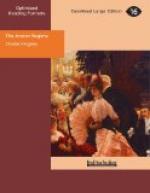Whether this ought to have been the history of primaeval civilisation, is a question not to be determined here. That it is the history thereof, is surely patent to anyone who will imagine to himself what must have been. In the first place, the strongest and cunningest savage must have had the chance of producing children more strong and cunning than the average; he would have—the strongest savage has still—the power of obtaining a wife, or wives, superior in beauty and in household skill, which involves superiority of intellect; and therefore his children would—some of them at least—be superior to the average, both from the father’s and the mother’s capacities. They again would marry select wives; and their children again would do the same; till, in a very few generations, a family would have established itself, considerably superior to the rest of the tribe in body and mind, and become assuredly its ruling race.
Again, if one of that race invented a new weapon, a new mode of tillage, or aught else which gave him power, that would add to the superiority of his whole family. For the invention would be jealously kept among them as a mystery, a hereditary secret. To this simple cause, surely, is to be referred the system of hereditary caste occupations, whether in Egypt or Hindoostan. To this, too, the fact that alike in Greek and in Teutonic legend the chief so often appears, not merely as the best warrior and best minstrel, but as the best smith, armourer, and handicraftsman of his tribe. If, however, the inventor happened to be a low-born genius, its advantages would still accrue to the ruling race. For nothing could be more natural or more easy—as more than one legend intimates—than that the king should extort the new secret from his subject, and then put him to death to prevent any further publicity.
Two great inventive geniuses we may see dimly through the abysses of the past, both of whom must have become in their time great chiefs, founders of mighty aristocracies—it may be, worshipped after their death as gods.
The first, who seems to have existed after the age in which the black race colonised Australia, must have been surely a man worthy to hold rank with our Brindleys, Watts, and Stephensons. For he invented (and mind, one man must have invented the thing first, and by the very nature of it, invented it all at once) an instrument so singular, unexpected, unlike anything to be seen in nature, that I wonder it has not been called, like the plough, the olive, or the vine, a gift of the immortal gods: and yet an instrument so simple, so easy, and so perfect, that it spread over all races in Europe and America, and no substitute could be found for it till the latter part of the fifteenth century. Yes, a great genius was he, and the consequent founder of a great aristocracy and conquering race, who first invented for himself and his children after him a—bow and arrow.




